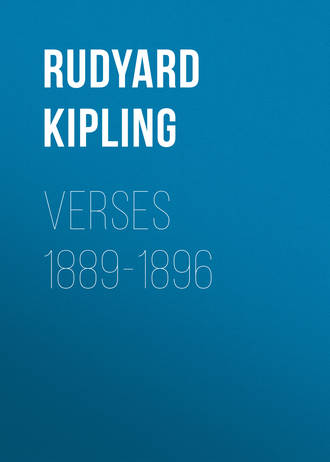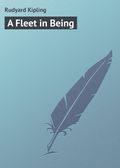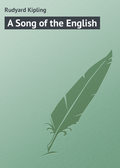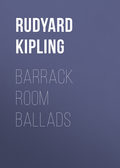полная версия

Редьярд Джозеф Киплинг
Verses 1889-1896
THE EXPLANATION
Love and Death once ceased their strife
At the Tavern of Man’s Life.
Called for wine, and threw – alas! —
Each his quiver on the grass.
When the bout was o’er they found
Mingled arrows strewed the ground.
Hastily they gathered then
Each the loves and lives of men.
Ah, the fateful dawn deceived!
Mingled arrows each one sheaved;
Death’s dread armoury was stored
With the shafts he most abhorred;
Love’s light quiver groaned beneath
Venom-headed darts of Death.
Thus it was they wrought our woe
At the Tavern long ago.
Tell me, do our masters know,
Loosing blindly as they fly,
Old men love while young men die?
THE GIFT OF THE SEA
The dead child lay in the shroud,
And the widow watched beside;
And her mother slept, and the Channel swept
The gale in the teeth of the tide.
But the mother laughed at all.
“I have lost my man in the sea,
And the child is dead. Be still,” she said,
“What more can ye do to me?”
The widow watched the dead,
And the candle guttered low,
And she tried to sing the Passing Song
That bids the poor soul go.
And “Mary take you now,” she sang,
“That lay against my heart.”
And “Mary smooth your crib to-night,”
But she could not say “Depart.”
Then came a cry from the sea,
But the sea-rime blinded the glass,
And “Heard ye nothing, mother?” she said,
“‘Tis the child that waits to pass.”
And the nodding mother sighed.
“‘Tis a lambing ewe in the whin,
For why should the christened soul cry out
That never knew of sin?”
“O feet I have held in my hand,
O hands at my heart to catch,
How should they know the road to go,
And how should they lift the latch?”
They laid a sheet to the door,
With the little quilt atop,
That it might not hurt from the cold or the dirt,
But the crying would not stop.
The widow lifted the latch
And strained her eyes to see,
And opened the door on the bitter shore
To let the soul go free.
There was neither glimmer nor ghost,
There was neither spirit nor spark,
And “Heard ye nothing, mother?” she said,
“‘Tis crying for me in the dark.”
And the nodding mother sighed:
“‘Tis sorrow makes ye dull;
Have ye yet to learn the cry of the tern,
Or the wail of the wind-blown gull?”
“The terns are blown inland,
The gray gull follows the plough.
‘Twas never a bird, the voice I heard,
O mother, I hear it now!”
“Lie still, dear lamb, lie still;
The child is passed from harm,
‘Tis the ache in your breast that broke your rest,
And the feel of an empty arm.”
She put her mother aside,
“In Mary’s name let be!
For the peace of my soul I must go,” she said,
And she went to the calling sea.
In the heel of the wind-bit pier,
Where the twisted weed was piled,
She came to the life she had missed by an hour,
For she came to a little child.
She laid it into her breast,
And back to her mother she came,
But it would not feed and it would not heed,
Though she gave it her own child’s name.
And the dead child dripped on her breast,
And her own in the shroud lay stark;
And “God forgive us, mother,” she said,
“We let it die in the dark!”
EVARRA AND HIS GODS
Read here:
This is the story of Evarra – man –
Maker of Gods in lands beyond the sea.
Because the city gave him of her gold,
Because the caravans brought turquoises,
Because his life was sheltered by the King,
So that no man should maim him, none should steal,
Or break his rest with babble in the streets
When he was weary after toil, he made
An image of his God in gold and pearl,
With turquoise diadem and human eyes,
A wonder in the sunshine, known afar,
And worshipped by the King; but, drunk with pride,
Because the city bowed to him for God,
He wrote above the shrine: “Thus Gods are made,
And whoso makes them otherwise shall die.”
And all the city praised him… Then he died.
Read here the story of Evarra – man —
Maker of Gods in lands beyond the sea.
Because the city had no wealth to give,
Because the caravans were spoiled afar,
Because his life was threatened by the King,
So that all men despised him in the streets,
He hewed the living rock, with sweat and tears,
And reared a God against the morning-gold,
A terror in the sunshine, seen afar,
And worshipped by the King; but, drunk with pride,
Because the city fawned to bring him back,
He carved upon the plinth:
“Thus Gods are made,
And whoso makes them otherwise shall die.”
And all the people praised him… Then he died.
Read here the story of Evarra – man —
Maker of Gods in lands beyond the sea.
Because he lived among a simple folk,
Because his village was between the hills,
Because he smeared his cheeks with blood of ewes,
He cut an idol from a fallen pine,
Smeared blood upon its cheeks, and wedged a shell
Above its brows for eyes, and gave it hair
Of trailing moss, and plaited straw for crown.
And all the village praised him for this craft,
And brought him butter, honey, milk, and curds.
Wherefore, because the shoutings drove him mad,
He scratched upon that log: “Thus Gods are made,
And whoso makes them otherwise shall die.”
And all the people praised him… Then he died.
Read here the story of Evarra – man —
Maker of Gods in lands beyond the sea.
Because his God decreed one clot of blood
Should swerve one hair’s-breadth from the pulse’s path,
And chafe his brain, Evarra mowed alone,
Rag-wrapped, among the cattle in the fields,
Counting his fingers, jesting with the trees,
And mocking at the mist, until his God
Drove him to labour. Out of dung and horns
Dropped in the mire he made a monstrous God,
Abhorrent, shapeless, crowned with plantain tufts,
And when the cattle lowed at twilight-time,
He dreamed it was the clamour of lost crowds,
And howled among the beasts:
“Thus Gods are made,
And whoso makes them otherwise shall die.”
Thereat the cattle bellowed… Then he died.
Yet at the last he came to Paradise,
And found his own four Gods, and that he wrote;
And marvelled, being very near to God,
What oaf on earth had made his toil God’s law,
Till God said mocking: “Mock not. These be thine.”
Then cried Evarra: “I have sinned!” – “Not so.
If thou hadst written otherwise, thy Gods
Had rested in the mountain and the mine,
And I were poorer by four wondrous Gods,
And thy more wondrous law, Evarra. Thine,
Servant of shouting crowds and lowing kine.”
Thereat, with laughing mouth, but tear-wet eyes,
Evarra cast his Gods from Paradise.
This is the story of Evarra – man —
Maker of Gods in lands beyond the sea.
THE CONUNDRUM OF THE WORKSHOPS
When the flush of a new-born sun fell first on Eden’s green and gold,
Our father Adam sat under the Tree and scratched with a stick in the mould;
And the first rude sketch that the world had seen was joy to his mighty heart,
Till the Devil whispered behind the leaves, “It’s pretty, but is it Art?”
Wherefore he called to his wife, and fled to fashion his work anew —
The first of his race who cared a fig for the first, most dread review;
And he left his lore to the use of his sons – and that was a glorious gain
When the Devil chuckled “Is it Art?” in the ear of the branded Cain.
They fought and they talked in the North and the South,
they talked and they fought in the West,
Till the waters rose on the pitiful land, and the poor Red Clay had rest —
Had rest till that dank blank-canvas dawn when the dove was preened to start,
And the Devil bubbled below the keel: “It’s human, but is it Art?”
They builded a tower to shiver the sky and wrench the stars apart,
Till the Devil grunted behind the bricks: “It’s striking, but is it Art?”
The stone was dropped at the quarry-side and the idle derrick swung,
While each man talked of the aims of Art, and each in an alien tongue.
The tale is as old as the Eden Tree – and new as the new-cut tooth —
For each man knows ere his lip-thatch grows he is master of Art and Truth;
And each man hears as the twilight nears, to the beat of his dying heart,
The Devil drum on the darkened pane: “You did it, but was it Art?”
We have learned to whittle the Eden Tree to the shape of a surplice-peg,
We have learned to bottle our parents twain in the yelk of an addled egg,
We know that the tail must wag the dog, for the horse is drawn by the cart;
But the Devil whoops, as he whooped of old: “It’s clever, but is it Art?”
When the flicker of London sun falls faint on the Club-room’s green and gold,
The sons of Adam sit them down and scratch with their pens in the mould —
They scratch with their pens in the mould of their graves,
and the ink and the anguish start,
For the Devil mutters behind the leaves: “It’s pretty, but is it Art?”
Now, if we could win to the Eden Tree where the Four Great Rivers flow,
And the Wreath of Eve is red on the turf as she left it long ago,
And if we could come when the sentry slept and softly scurry through,
By the favour of God we might know as much – as our father Adam knew!
THE LEGEND OF EVIL
I
This is the sorrowful story
Told when the twilight fails
And the monkeys walk together
Holding their neighbours’ tails: —
“Our fathers lived in the forest,
Foolish people were they,
They went down to the cornland
To teach the farmers to play.
“Our fathers frisked in the millet,
Our fathers skipped in the wheat,
Our fathers hung from the branches,
Our fathers danced in the street.
“Then came the terrible farmers,
Nothing of play they knew,
Only..they caught our fathers
And set them to labour too!
“Set them to work in the cornland
With ploughs and sickles and flails,
Put them in mud-walled prisons
And – cut off their beautiful tails!
“Now, we can watch our fathers,
Sullen and bowed and old,
Stooping over the millet,
Sharing the silly mould,
“Driving a foolish furrow,
Mending a muddy yoke,
Sleeping in mud-walled prisons,
Steeping their food in smoke.
“We may not speak to our fathers,
For if the farmers knew
They would come up to the forest
And set us to labour too.”
This is the horrible story
Told as the twilight fails
And the monkeys walk together
Holding their kinsmen’s tails.
II
‘Twas when the rain fell steady an’ the Ark was pitched an’ ready,
That Noah got his orders for to take the bastes below;
He dragged them all together by the horn an’ hide an’ feather,
An’ all excipt the Donkey was agreeable to go.
Thin Noah spoke him fairly, thin talked to him sevarely,
An’ thin he cursed him squarely to the glory av the Lord: —
“Divil take the ass that bred you, and the greater ass that fed you —
Divil go wid you, ye spalpeen!” an’ the Donkey went aboard.
But the wind was always failin’, an’ ‘twas most onaisy sailin’,
An’ the ladies in the cabin couldn’t stand the stable air;
An’ the bastes betwuxt the hatches, they tuk an’ died in batches,
Till Noah said: – “There’s wan av us that hasn’t paid his fare!”
For he heard a flusteration ‘mid the bastes av all creation —
The trumpetin’ av elephints an’ bellowin’ av whales;
An’ he saw forninst the windy whin he wint to stop the shindy
The Divil wid a stable-fork bedivillin’ their tails.
The Divil cursed outrageous, but Noah said umbrageous: —
“To what am I indebted for this tenant-right invasion?”
An’ the Divil gave for answer: – “Evict me if you can, sir,
For I came in wid the Donkey – on Your Honour’s invitation.”
“We may not speak to our fathers,
For if the farmers knew
They would come up to the forest
And set us to labour too.”
THE ENGLISH FLAG
Above the portico a flag-staff, bearing the Union Jack,
remained fluttering in the flames for some time, but ultimately
when it fell the crowds rent the air with shouts,
and seemed to see significance in the incident. —
DAILY PAPERS.
Winds of the World, give answer! They are whimpering to and fro —
And what should they know of England who only England know? —
The poor little street-bred people that vapour and fume and brag,
They are lifting their heads in the stillness to yelp at the English Flag!
Must we borrow a clout from the Boer – to plaster anew with dirt?
An Irish liar’s bandage, or an English coward’s shirt?
We may not speak of England; her Flag’s to sell or share.
What is the Flag of England? Winds of the World, declare!
The North Wind blew: – “From Bergen my steel-shod vanguards go;
I chase your lazy whalers home from the Disko floe;
By the great North Lights above me I work the will of God,
And the liner splits on the ice-field or the Dogger fills with cod.
“I barred my gates with iron, I shuttered my doors with flame,
Because to force my ramparts your nutshell navies came;
I took the sun from their presence, I cut them down with my blast,
And they died, but the Flag of England blew free ere the spirit passed.
“The lean white bear hath seen it in the long, long Arctic night,
The musk-ox knows the standard that flouts the Northern Light:
What is the Flag of England? Ye have but my bergs to dare,
Ye have but my drifts to conquer. Go forth, for it is there!”
The South Wind sighed: – “From the Virgins my mid-sea course was ta’en
Over a thousand islands lost in an idle main,
Where the sea-egg flames on the coral and the long-backed breakers croon
Their endless ocean legends to the lazy, locked lagoon.
“Strayed amid lonely islets, mazed amid outer keys,
I waked the palms to laughter – I tossed the scud in the breeze —
Never was isle so little, never was sea so lone,
But over the scud and the palm-trees an English flag was flown.
“I have wrenched it free from the halliard to hang for a wisp on the Horn;
I have chased it north to the Lizard – ribboned and rolled and torn;
I have spread its fold o’er the dying, adrift in a hopeless sea;
I have hurled it swift on the slaver, and seen the slave set free.
“My basking sunfish know it, and wheeling albatross,
Where the lone wave fills with fire beneath the Southern Cross.
What is the Flag of England? Ye have but my reefs to dare,
Ye have but my seas to furrow. Go forth, for it is there!”
The East Wind roared: – “From the Kuriles, the Bitter Seas, I come,
And me men call the Home-Wind, for I bring the English home.
Look – look well to your shipping! By the breath of my mad typhoon
I swept your close-packed Praya and beached your best at Kowloon!
“The reeling junks behind me and the racing seas before,
I raped your richest roadstead – I plundered Singapore!
I set my hand on the Hoogli; as a hooded snake she rose,
And I flung your stoutest steamers to roost with the startled crows.
“Never the lotus closes, never the wild-fowl wake,
But a soul goes out on the East Wind that died for England’s sake —
Man or woman or suckling, mother or bride or maid —
Because on the bones of the English the English Flag is stayed.
“The desert-dust hath dimmed it, the flying wild-ass knows,
The scared white leopard winds it across the taintless snows.
What is the Flag of England? Ye have but my sun to dare,
Ye have but my sands to travel. Go forth, for it is there!”
The West Wind called: – “In squadrons the thoughtless galleons fly
That bear the wheat and cattle lest street-bred people die.
They make my might their porter, they make my house their path,
Till I loose my neck from their rudder and whelm them all in my wrath.
“I draw the gliding fog-bank as a snake is drawn from the hole,
They bellow one to the other, the frighted ship-bells toll,
For day is a drifting terror till I raise the shroud with my breath,
And they see strange bows above them and the two go locked to death.
“But whether in calm or wrack-wreath, whether by dark or day,
I heave them whole to the conger or rip their plates away,
First of the scattered legions, under a shrieking sky,
Dipping between the rollers, the English Flag goes by.
“The dead dumb fog hath wrapped it – the frozen dews have kissed —
The naked stars have seen it, a fellow-star in the mist.
What is the Flag of England? Ye have but my breath to dare,
Ye have but my waves to conquer. Go forth, for it is there!”
“CLEARED”
(In Memory of a Commission)
Help for a patriot distressed, a spotless spirit hurt,
Help for an honourable clan sore trampled in the dirt!
From Queenstown Bay to Donegal, O listen to my song,
The honourable gentlemen have suffered grievous wrong.
Their noble names were mentioned – O the burning black disgrace! —
By a brutal Saxon paper in an Irish shooting-case;
They sat upon it for a year, then steeled their heart to brave it,
And “coruscating innocence” the learned Judges gave it.
Bear witness, Heaven, of that grim crime beneath the surgeon’s knife,
The honourable gentlemen deplored the loss of life!
Bear witness of those chanting choirs that burk and shirk and snigger,
No man laid hand upon the knife or finger to the trigger!
Cleared in the face of all mankind beneath the winking skies,
Like ph]oenixes from Ph]oenix Park (and what lay there) they rise!
Go shout it to the emerald seas – give word to Erin now,
Her honourable gentlemen are cleared – and this is how: —
They only paid the Moonlighter his cattle-hocking price,
They only helped the murderer with counsel’s best advice,
But – sure it keeps their honour white – the learned Court believes
They never gave a piece of plate to murderers and thieves.
They never told the ramping crowd to card a woman’s hide,
They never marked a man for death – what fault of theirs he died? —
They only said “intimidate”, and talked and went away —
By God, the boys that did the work were braver men than they!
Their sin it was that fed the fire – small blame to them that heard —
The “bhoys” get drunk on rhetoric, and madden at a word —
They knew whom they were talking at, if they were Irish too,
The gentlemen that lied in Court, they knew, and well they knew.
They only took the Judas-gold from Fenians out of jail,
They only fawned for dollars on the blood-dyed Clanna-Gael.
If black is black or white is white, in black and white it’s down,
They’re only traitors to the Queen and rebels to the Crown.
“Cleared”, honourable gentlemen! Be thankful it’s no more: —
The widow’s curse is on your house, the dead are at your door.
On you the shame of open shame, on you from North to South
The hand of every honest man flat-heeled across your mouth.
“Less black than we were painted”? – Faith, no word of black was said;
The lightest touch was human blood, and that, you know, runs red.
It’s sticking to your fist to-day for all your sneer and scoff,
And by the Judge’s well-weighed word you cannot wipe it off.
Hold up those hands of innocence – go, scare your sheep together,
The blundering, tripping tups that bleat behind the old bell-wether;
And if they snuff the taint and break to find another pen,
Tell them it’s tar that glistens so, and daub them yours again!
“The charge is old”? – As old as Cain – as fresh as yesterday;
Old as the Ten Commandments – have ye talked those laws away?
If words are words, or death is death, or powder sends the ball,
You spoke the words that sped the shot – the curse be on you all.
“Our friends believe”? – Of course they do – as sheltered women may;
But have they seen the shrieking soul ripped from the quivering clay?
They! – If their own front door is shut,
they’ll swear the whole world’s warm;
What do they know of dread of death or hanging fear of harm?
The secret half a county keeps, the whisper in the lane,
The shriek that tells the shot went home behind the broken pane,
The dry blood crisping in the sun that scares the honest bees,
And shows the “bhoys” have heard your talk – what do they know of these?
But you – you know – ay, ten times more; the secrets of the dead,
Black terror on the country-side by word and whisper bred,
The mangled stallion’s scream at night, the tail-cropped heifer’s low.
Who set the whisper going first? You know, and well you know!
My soul! I’d sooner lie in jail for murder plain and straight,
Pure crime I’d done with my own hand for money, lust, or hate,
Than take a seat in Parliament by fellow-felons cheered,
While one of those “not provens” proved me cleared as you are cleared.
Cleared – you that “lost” the League accounts – go, guard our honour still,
Go, help to make our country’s laws that broke God’s law at will —
One hand stuck out behind the back, to signal “strike again”;
The other on your dress-shirt-front to show your heart is clane.
If black is black or white is white, in black and white it’s down,
You’re only traitors to the Queen and rebels to the Crown.
If print is print or words are words, the learned Court perpends: —
We are not ruled by murderers, but only – by their friends.







